#continental congress
Text
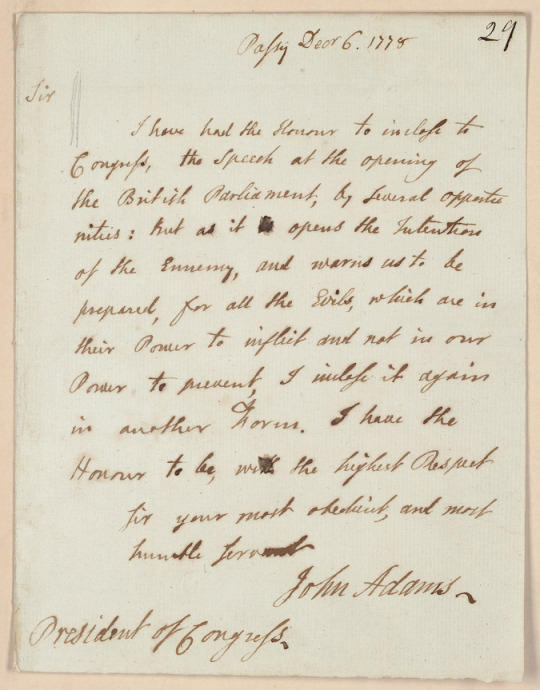
Letter from John Adams to the President of Congress
Record Group 360: Records of the Continental and Confederation Congresses and the Constitutional ConventionSeries: Papers of the Continental CongressFile Unit: Letters from John Adams
Passy Decr 6. 1778 [29 in upper right corner] Sir I have had the Honour to inclose to Congress, the speech at the opening of the British Parliament, by several opportunities: But as it opens the Intentions of the Ennemy, and warns us to be prepared, for all the Evils, which are in their Power to inflict and not in our Power to prevent, I inclose it again in another form. I have the Honour to be, with the highest Respect Sir your most obedient, and most humble servant [signed] John Adams. President of Congress.
#archivesgov#December 6#1778#american revolution#war of independence#continental congress#john adams#18th century
61 notes
·
View notes
Photo
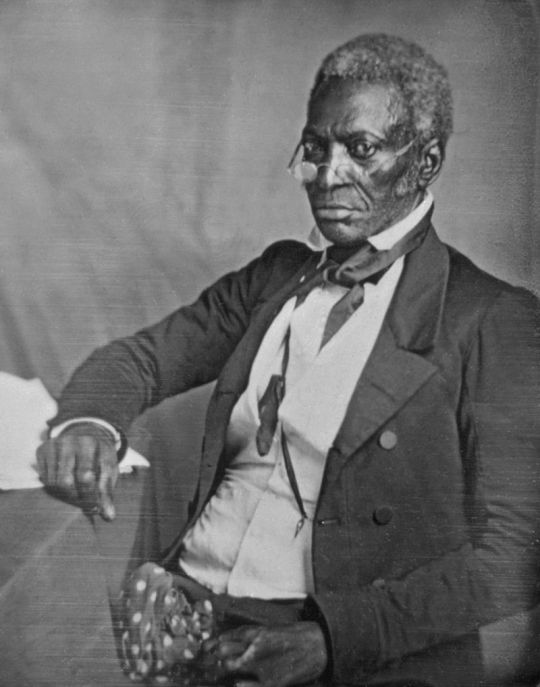
John Hanson (died c. 1860) was an African American politician in Liberia. He served in Colonial Council and as a senator from Grand Bassa County following Liberia's independence in 1847. He was born into slavery, but he purchased his freedom and emigrated from Baltimore to Liberia at age thirty-six.

In Liberia, he joined the growing mercantile class. He also served as Commissary in the same county for several years, furnishing a house for the storage of arms and ammunition. Hanson died in 1860, and was mourned as a "faithful and patriotic servant" by Liberian president Stephen Allen Benson.

Senator Hanson has sometimes been misidentified as being John Hanson of Maryland, a European politician who served as a President of the Continental Congress during the American Revolution.

#john hanson#liberia#liberian#continental congress#american revolution#grand bassa county#european#enslaved#baltimore#maryland#senator hanson#stephen allen benson#kemetic dreams
98 notes
·
View notes
Text
AMREV SLANDER MEME !!
*Disclaimer: These are just jokes, not to be taken seriously. I made this at 1am instead of sleeping.
TW: clown makeup, skeletons
#amrev#amrev memes#amrev slander#continental congress#stupid mfs#richard kidder meade#robert harrison#benedict arnold#alexander hamilton#john laurens#john andre#tw: clowns#tw: skeleton
309 notes
·
View notes
Text
Congress @ George Washington any time he asks for aid during the war

106 notes
·
View notes
Text
Thomas Jefferson should gift Congress a weather thermometer so he doesn’t have to the human embodiment of that anymore 😍😍
#colonial america#founding fathers#1776#1776 the musical#1776 1972 film#thomas jefferson#continental congress
20 notes
·
View notes
Text
My brain for no apparent reason: Mr. Adams but Mr. Adams

#amrev#american revolution#continental congress#john adams#thomas jefferson#benjamin franklin#1776 musical#robert livingston#declaration of independence
37 notes
·
View notes
Text
Spent time in the library between classes reading more of Vol. III of The PAH and this made me almost laugh. Of course he did this. What a statement. 😂

“Continental Congress Remarks on Raising Funds for the United States, [27 January 1783],” The Papers of Alexander Hamilton, vol. 3, pp. 245-246
#grace’s random ramble#alexander hamilton#historical alexander hamilton#amrev#continental congress#the papers of alexander hamilton#american history#amrev fandom
16 notes
·
View notes
Text
A fifth AGAIN
LK 108: Congress 2, Just in time for a shutdown-aloo
(pt1)(pt2)(pt3)(pt4)(pt5)

Dad!Moses has seen this before. He knows James' moodiness.

Lolololol neither did James

Him paying on time doesn't mean he's totally honest.

Sarah you don't need to rub salt in the wounds.

"What did I just say I literally sewed these buttons onto my dad's jacket, keep up"


"....oh fuuuuuuuuuuuuuuuuuuuuuuuuuuuuuuuuuuuck"

"...Wait. Chaos. Chaos!!!!"

I feel like this VA's voice is to velvety and rich to fully communicate how much the man could apparently drone on.
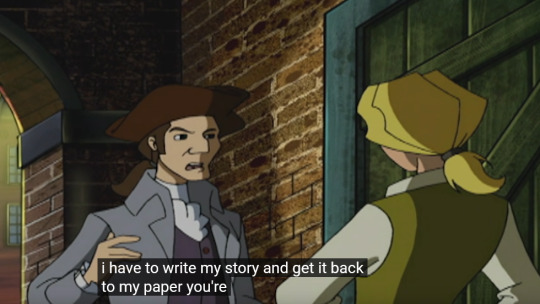
So like. James has been bungling it all day. But Weaselly Paul just... accepts that he managed to get it done now? You know I'm just not so sure Britain is sending its finest.

Chaos Crew gon fuck you up.


Passive perception +6 on this kid, this is why he's the field agent who gets all the contracts.

You Roll I Roll We Roll

Sarah honey are you feeling all right? You look like you're experiencing a touch of cognitive dissonance. Maybe a dash of inner conflict? Any long-held values get upheaved? Any chance you've been getting closer to a beagle/great dane puppy of a boy in the last few months?


Source. British man said Source.


Tell us how you really feel, Paul.

youtube

She's right beside you, bud, but it is cute how you worry.

I'm sorry something about the visual of her just popping right up from the grass gave me a chuckle. She's becoming feral, but perhaps she was feral all along. Man she really is her father's child, isn't she.

Props to the 18th century teenage boy for having this much emotional intelligence to reflect on and talk about his feelings so easily.

oh wow AND he's asking about her feelings? The bare minimum in a caring relationship? Be still my heart! Be careful you don't swoon, Sarah.



I love hearing her mental gymnastics. Also damn, don't cross a Phillips, she is completely down with ruining that man's career for making her friends look like idiots. Honestly, though, same. Maybe she gets that from her mother?

Holy fucking shit did Henri sabotage the boat

Oh, he knows, James. He knows.

I know I could probably make an inane comment about Benji Franx here but honestly I like leaning more into the fact that he cares about the only child of his London Beloved, Lady Phillips. I bet he was kind of like the Cool Uncle to Sarah when he was in London for all that time.
anyway byeeee
#liberty's kids#james hiller#sarah phillips#amrev#henri lefebvre#continental congress#tricorn on the cob watches LK and makes inane commentary.#tricorn watches
8 notes
·
View notes
Text
Dear Sir:
I Love to receive Letters very well, much better than I love to write them. I make but a poor figure at Composition, my head is much too fickle, my Thoughts are running after bird’s eggs, play and trifles, till I get vexd with my Self. Mamma has a troublesome task to keep me Steady, and I own I am ashamed of myself. I Have but Just entered the 3d volume of Smollet [Tobias Smollett’s 16-volume A Complete History of England], tho I had designed to have got it Half through by this time. I have determined this week to be more diligent...I have Set myself a Stent, and determine to read the 3d volume Half out. If I can but keep my resolution I will write again at the end of the week, and give a better account of myself. I wish, sir, you would give me Some instructions with regard to my time and advise me how to proportion my Studies and my Play, in writing and I will keep them by me and endeavour to follow them.
I am, dear Sir, with a present determination of growing better, yours,
John Quincy Adams
PS: Sir if you will be So good as to favour me with a Blank book I will transcribe the most remarkable occurrences I met with in my reading which will Serve to fix them upon my mind.
-- Letter written by John Quincy Adams to his father, John Adams, June 2, 1777.
At that time, John Adams was representing Massachusetts as a delegate to the Continental Congress in Philadelphia.
At that time, John Quincy Adams was NINE years old.
#History#John Adams#John Quincy Adams#Adams Family#Founding Fathers#Founders#Continental Congress#JQA#President Adams#Letters#Presidential Writings#Letters by Presidents#First Families#American Revolution#Politics
71 notes
·
View notes
Text
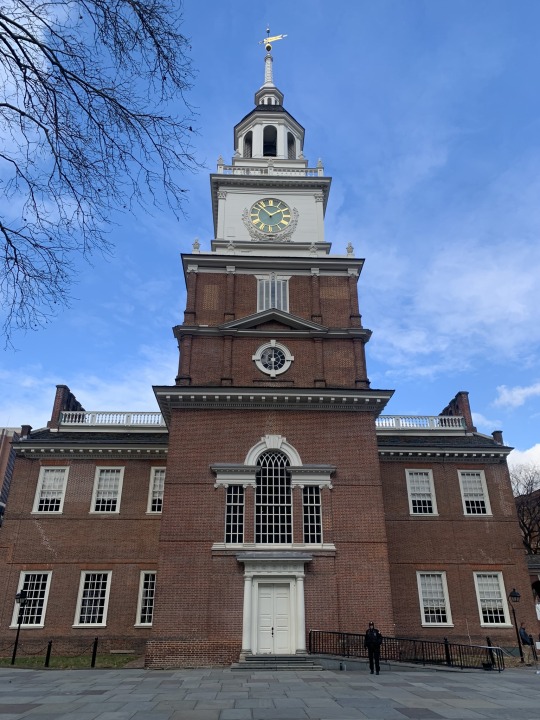






January 7th, 2023
Independence Hall, Philadelphia, Pennsylvania
#photography#philadelphia#pennsylvania#pa#city of brotherly love#history#revolutionary war#early american history#congress#congressional history#first congress#continental congress#george washington#founding fathers#independence hall#independence national historical park#national historical park#national park service#nps#america#usa#united states of america
4 notes
·
View notes
Text
24 Days of La Fayette: December 19th - Jean-Joseph Soubadère de Gimat
With the end of this little series fast approaching, we now have the time to guide our attention towards the more prominent men among La Fayette’s aide-de-camps. Jean-Joseph Soubadère de Gimat, later the Chevalier de Gimat was one of La Fayette’s earliest and most trusted aide-de-camps. In fact, without Gimat, La Fayette’s little adventure in America might have taken a grisly turn early on.
Gimat was born in 1747 (or maybe as early as 1743) in Gascony into a family of military merits. He joined the French Army in the 1760’ as an Ensign in the Viennois Regiment.

Idzerda Stanley J. et al., editors, Lafayette in the Age of the American Revolution: Selected Letters and Papers, 1776–1790, Volume 1, December 7, 1776–March 30, 1778, Cornell University Press, 1977, p. 18-19.
Gimat was one of the men that accompanied La Fayette onboard La Victoire to America. Silas Dean promised him the rank of Major (commission dated December 1, 1776.) Their travel to America had been rather uneventful for Gimat and when La Victoire anchored some miles north of Charleston, Gimat accompanied La Fayette and eight other officers and servants that travelled on land to Charleston and nine of these men, Gimat included, travelled then from Charleston to Philadelphia. While travelling to Philadelphia, Gimat became ill, potentially with a fever but more likely with dysentery. He stayed behind in Petersburg in Virginian until he was well again and could rejoin the rest of the group.
Congress at first was very, very reluctant to grant La Fayette his rank as Major General or indeed any rank to any of these French officers. Things turned out alright for most if these men in the end, thanks to no small part to La Fayette’s relentlessness. Gimat was eventually made an aide-de-camp to La Fayette with the promised rank or Major.
Gimat distinguishes himself for the first time during the Battle of Brandywine. He was with La Fayette when La Fayette set out to organize the retreat of the American troops – but I let our Marquis tell the story:
(…) and it was whilst M. de Lafayette was rallying the troops that a ball passed through his leg; -- at that moment all those remaining on the field gave way. M. de Lafayette was indebted to Gimat, his aide-de-camp, for the happiness of getting upon his horse.
Marquis de La Fayette, Memoirs, Correspondences and Manuscripts of General Lafayette, Vol. 1, Craighead and Allen, New York, 1837, p. 23.
After giving first aide on the battlefield, Gimat was at La Fayette’s side during his convalescence. La Fayette wrote to his wife Adrienne on October 1, 1777:
Among the French officers, all of whom have shown interest in my welfare, I have M. de Gimat as an aide-de-camp. Both before and since the battle he has followed me like a shadow and has shown every proof of devotion to me. So, dearest, you may be at ease on this matter now and in the future.
Idzerda Stanley J. et al., editors, Lafayette in the Age of the American Revolution: Selected Letters and Papers, 1776–1790, Volume 1, December 7, 1776–March 30, 1778, Cornell University Press, 1977, p. 114-119.
La Fayette also used this episode of forced inactivity to apply to Washington not only for an active command for himself but also for commissions for Edmund Brice (another one of his aide-de-camps that I have already covered) and Gimat. Washington was at a total loss what to do with La Fayette and so he wrote to his friend and member of the Continental Congress Benjamin Harrison on August 19, 1777:
If I did not misunderstand what you, or some other Member of Congress said to me respecting the appointment of the Marquis de Le Fiatte, he has misceived the design of his appointment, or Congress did not understand the extent of his views, for certain it is, If I understand him, that he does not conceive his Commission is merely honorary; but given with a view to command a division of this Army. True, he has said that he is young, & inexperienced, but at the same time has always accompanied it with a hint, that so soon as I shall think him fit for the Command of a division, he shall be ready to enter upon the duties of it; & in the mean time, has offer'd his service for a smaller Command, to which I may add, that he has actually applied to me (by direction he says from Mr. Hancock) for Commissions for his Two Aid de Camps.
Idzerda Stanley J. et al., editors, Lafayette in the Age of the American Revolution: Selected Letters and Papers, 1776–1790, Volume 1, December 7, 1776–March 30, 1778, Cornell University Press, 1977, p. 104-105.
The efforts of La Fayette did not stop there. He also wrote to Henry Laurens on the matter on December 18, 1777:
Let me speack not to the president of Congress but to my friend about a matter which concerns me very much. Monsieur le Chevalier de Gimat my first aid de camp is a man of birth, education, and merit. He came over vith the desire of being in my family and never asked neither desired any monney since the begining of this expedition. He is now captain of infanterye in the french service not captain by commission or retreat but captain in a rgt. where he has done two campaigns of war. Do'nt you think that if that gentleman schould ask here the commission of lieutenant colonel following the army he would not obtain it? Tho his being in my family prevents his advancement-what is your opinion about the matter? Must I apply to the president of Congress? All what I wrait here is entirely unknown to Mr. de Gimat who never spoke to me a word of it.
Idzerda Stanley J. et al., editors, Lafayette in the Age of the American Revolution: Selected Letters and Papers, 1776–1790, Volume 1, December 7, 1776–March 30, 1778, Cornell University Press, 1977, p. 195-197.
While La Fayette lobbying for his aide-de-camps, subordinate officers or fellow Frenchman was far from novel, Gimat’s case is different. He was one of the few persons that had not approach La Fayette and asked to be thought of. La Fayette took the initiative here. And while our Marquis had to put in a bit of work, few men in America could resist La Fayette’s puppy-eyes. Gimat was commissioned a Lieutenant Colonel in February of 1778.
In his new position he accompanied La Fayette on his doomed expedition to Canada in February and March of 1778. He was also with La Fayette in Rhode Island in the Summer of 1778 when a joined attack by the newly arrived French and American troops were planned. La Fayette wrote to the Comte d’Estaing on July 30, 1778:
My letter is in the hands of M. de Gimat, who will also have the honor of delivering this one to you. He is a captain in the infantry of the Viennois regiment, a lieutanant colonel in the Continental army, my aide-de-camp, and my friend, upon whom you may rely in all matters with complete assurance. His merit, patriotism, and honesty match all the praises I can give them. I am so sure of the care M. de Gimat will take of my letter in every circumstance that I shall spare you the trouble of deciphering anything beyond my own handwriting. (…) There are certain things that you would perhaps find too long to write in cipher but that you could tell to M. de Gimat, upon whom you may well rely. That is an assurance I shall not give you lightly.
Idzerda Stanley J. et al., editors, Lafayette in the Age of the American Revolution: Selected Letters and Papers, 1776–1790, Volume 2, April 10, 1778–March 20, 1780, Cornell University Press, 1978, p. 122-125.
La Fayette’s trust in Gimat was absolute. We see in this example, that he did not deciphere his letter to d’Estaing, something that he habitually did, because he had not the shadow of a doubt that Gimat would safely deliver the letter. He often told the people he was corresponding with, that they could be completely open with Gimat and that they could tell absolutely everything that they otherwise would have told La Fayette. Gimat was also entrusted with arranging certain things on La Fayette’s behalf – and there was not a single time that Gimat betrayed or broke the trust placed in him.
After already obtaining the commission as a Lieutenant Colonel, La Fayette set out to further advance Gimat’s standing. He wrote to the President of Congress on October 27, 1778:
Mons. de Gimat an old soldier in the french Service, who has made the war in Germany, who came here upon very disinterested principles, has been with me ever since I have the honor to serve the United States. He was first a commissioned Major, and after the first Campaign a Commissioned Lieutenant-Colonel. Had he come two years ago with all the circumstances which Speack in his favor, he would have been made at once a It. clel. in the line — but he did choose to be my aid de camp. Was I to draw Comparisons I would Say that Mr. de Vienne to whom in every point Nature or talents may give Mr. de Gimat is fully equal, and some times superior, has been made a colonel at his arrival without having Seen so much service abroad, and any in this country.
Idzerda Stanley J. et al., editors, Lafayette in the Age of the American Revolution: Selected Letters and Papers, 1776–1790, Volume 2, April 10, 1778–March 20, 1780, Cornell University Press, 1978, p. 197-198.
The request was granted and was commissioned a brevet colonel on November 3, 1778 and two days later he received a certificate of his honourable service. Since Gimat desired to return to France for some time, he was also granted leave and Congress covered the expanses of his travels to and from France. He sailed on the Alliance and during the voyage was made aware of a plot between some senior officers to ruin the career and reputation of the Alliance’s Captain, Landais. La Fayette had been of the issue for some time but after things became more heated, he instructed Gimat to change out the Officers of the Alliance.
He returned with La Fayette onboard L’Hermione to America in March of 1780 and was given command of a battalion in the Brigade of Brigadier General Poor. The General Order from August 1, 1780 read:
Massachusetts 1st & 2nd brigades [to furnish] 8 [Companies in] 1 [battalion Commanded by] Colo. Sheppard [and] Major Trescott[.Massachusetts] 3d & 4th [brigades to furnish] 8 [Companies in] 1 [battalion Commanded by] Colo. Gimat [and] Major Keith. (…) The third and fourth Massachusetts brigades give two Subs. a Surgeon Mate and two Serjeants for the regiments to be commanded by Colonel Gimat.
“General Orders, 1 August 1780,” Founders Online, National Archives, [Original source: The Papers of George Washington, Revolutionary War Series, vol. 27, 5 July–27 August 1780, ed. Benjamin L. Huggins. Charlottesville: University of Virginia Press, 2019, pp. 384–387.] (12/19/2022)
Gimat’s Battalion was under the overall command of La Fayette and he himself wrote to the Prince de Poix on September 3, 1780:
I have a very pleasing command composed of about 2,000 light infantry drawn from the regiments, as are the grenadiers and chasseurs in Europe, and led by two brigadiers under me; 100 riflemen who are a kind of half-savage infantry; and a legion of 300 men, half infantry and half cavalry. These 2,400 men form a flying camp always in advance and independent of the main army, to which is added on occasion detachments of infantry and dragoons drawn from the army and always the militia of the region we are in. My own light infantry division is excellent; I gave a battalion to Gimat and ardently wish it had something to do. I give you these details because I know they interest you.
Idzerda Stanley J. et al., editors, Lafayette in the Age of the American Revolution: Selected Letters and Papers, 1776–1790, Volume 4, April 1, 1781–December 23, 1781, Cornell University Press, 1981, p. 164-167.
Gimat served under La Fayette all throughout the Virginia campaign and La Fayette was very careful in making sure that Gimat was not transferred away from him. However, not everybody in the army was pleased by the appointment, especially when the appointment was renewed for the next season. The matter was so displeasing to some, that no less than seven field officers threatened to resign. Alexander Hamilton wrote to George Washington on May 2, 1781:
I know less of the motives of dissatisfaction in the cases of Col Gimat and Major Galvan; but I have understood, that it is founded on their being appointed in the light corps for two successive campaigns. (…) Major Galvan, I am told, will probably be relieved. Col Gimat will be then the only brevet officer remaining in command. Your Excellency is the best judge of the proper limits, and there can be no doubt, that the rights of particular officers ought to give place to the general good and tranquillity of the service.
“From Alexander Hamilton to George Washington, [2 May 1781],” Founders Online, National Archives, [Original source: The Papers of Alexander Hamilton, vol. 2, 1779–1781, ed. Harold C. Syrett. New York: Columbia University Press, 1961, pp. 636–638.] (12/19/2022)
Being aware of the lingering dissatisfaction and knowing that Gimat might be relieved from his command, La Fayette had written to George Washington on April 12, 1781:
As to Clel. Gimat and Major Galvan, Now that their fate is Going to Be decided in a way which Cannot But Affect their feelings and Reputation, I think Myself obliged to Submit to Your Excellency an observation which for fear of Appearing Partial I Had Hitherto Omitted. I will therefore Confidentially Impart to you that Major Galvan is very Unpopular among the officers, while Colonel Gimat is particularly Beloved. Complaints Have often Been made to me against the one, while the other Has Ever Received from the officers under His Command the Most flattering testimonies of affection, and I may go so far as to Say that the Recalling of Clel. Gimat will Be very disagreable to His BataiIlon. This I Mention to Your Excellency, No that I think the Sentiments of the officers Must Induce you to Recall Major Galvan, a Measure which I would Be far from Advising, But Because this opposition Being perhaps owing to the partiality of the officers for or against private persons, and this Circumstance Being of a Very serious Nature for these two Gentlemen, I thought it My duty Not to withdraw Any Particulars from Your Excellency's knowledge.
Idzerda Stanley J. et al., editors, Lafayette in the Age of the American Revolution: Selected Letters and Papers, 1776–1790, Volume 4, April 1, 1781–December 23, 1781, Cornell University Press, 1981, p. 26-27.
Washington replied that it would be difficult to keep Gimat, all the while relieving Galvan, as much as he wished to be able to do so. In the end however, Gimat retained his position. It was therefor that he participated in the Battle of Yorktown. It fell to La Fayette to coordinate the American attack on redoubt number 10. He chose Gimat to be in command, ignoring the pleas of Alexander Hamilton to be named commander of the attack. Hamilton was deeply unsatisfied with this decision and turned to Washington. Washington overruled La Fayette’s decision and placed Hamilton in command, based on Hamilton’s seniority (and him being American.) La Fayette was not too happy with the decision, especially with Hamilton going over his head, but the affair was settled and he had to accept it.
Gimat participated nonetheless in the attack on the redoubt and was wounded in the assault. He was shot in the foot, but the injury was relatively minor and no bone was struck. Hamilton reported to La Fayette on October 15, 1781:
I have the honor to render you an account of the corps under my command in your attack of last night, upon the redoubt on the left of the enemy's lines. Agreeable to your orders we advanced in two columns with unloaded arms-the right composed of Lt. Col. Gimat's batalion and my own commanded by Major Fish-the left of a detachment commanded by Lt. Col. Laurens, destined to take the enemy in reverse, and intercept their retreat. The column on the right was preceded by a van guard of twenty men led by Lt. Mansfield-and a detachment of sappers and miners, commanded by Capt. Gilliland for the purpose of removing obstructions. (…) The rapidity and immediate success of the assault are the best comment on the behaviour of the troops. Lt. Col. Laurens distinguished himself by an exact and vigorous execution of his part of the plan, by entering the enemy's work with his corps among the foremost, and making prisoner the commanding officer of the redoubt. Lt. Col. Gimat's batalion which formed the van of the right attack and which fell under my immediate observation encouraged by the decisive and animated example of their leader advanced with an ardor and resolution superior to every obstacle. (…) Our killed and wounded you will perceive by the inclosed return. I sensibly felt at a critical period the loss of the assistance of Lt. Col. Gimat, who received a musket ball in his foot, which obliged him to retire from the field. Capt. Bets of Lauzen's corps, Capt. Hunt and Lt. Mansfield of Gimats were wounded with the bayonet in gallantly entering the work. Capt. Lt. Kirkpatrick of the corps of sappers and miners received a wound in the ditch.
Idzerda Stanley J. et al., editors, Lafayette in the Age of the American Revolution: Selected Letters and Papers, 1776–1790, Volume 4, April 1, 1781–December 23, 1781, Cornell University Press, 1981, p. 418-421.
La Fayette made sure to praise Gimat in front of Washington and everybody else.
Gimat recovered and returned to France in February of 1782 but only resigned his commission on November 3, 1783. By the spring of 1782, he had been advanced to the rank of Colonel in the French army and had been given command of the Regiment de Martinique stationed at Fort Royal in Martinique. On July 12, 1784 he wrote to George Washington from Martinique – and yes, Gimat was one of the few of La Fayette’s French aide-de-camps that became fluent in English.
Dear General
I embrace with the highest pleasure the opportunity of my friend comte de Kersaint commanding a small fleet bounding to cheaseapeak bay, to present the hommages of my heart to your Exellency and to renew the respectful attachement which has devoted for ever to you. I Wished most ardently to follow comte de Kersaint for enjoing the happiness of paying a visit to you dear general, to offer you my best thanks for all the Kindness I have So often experienced from you, and to See once more my Brothers Soldiers of america, the remembrance of them being always very precious to me and will be the Same as long as I live. it is to you dear general and to the honor of having Served under the Standards of the american army that I am indebted of my promotions in our french army, the last flaters me above all I can express it and I like very much of repeating to Your, Exellency, that I feel better then I can’t explain it here the acknowledgment that I owe to your Kindess & that I Shall be jaloux at any time and in all the circumstances you would be pleased to preserve them to me.
in the last letters I received from paris it was repported the marquis de la fayette intended to go again to america it was given to me by the duc de Castries as a certainty, I wish he would pay a visit to the west indias in going to america and get Leave from the governor of martinico to attend him in his voyages trough a contry where he will meet with So many friends and the first of all your Excelency.
if I can be any ways Serviesable to you dear general, here or elsewhere I beg you will command me—being most Sincerely & affectionately with a respectful attachement your very humble and obedient Servant
Gimat.
Colonel du regt de la martinique
Give me leave to beg of you to present my best compliments to mistress Washington.
“To George Washington from Gimat, 12 July 1784,” Founders Online, National Archives, [Original source: The Papers of George Washington, Confederation Series, vol. 1, 1 January 1784 – 17 July 1784, ed. W. W. Abbot. Charlottesville: University Press of Virginia, 1992, pp. 498–499.] (12/19/2022)
At the start of the French Revolution in 1789 he was made the Gouvenour of St. Lucia, a post that he would occupy until early June of 1792 when he was disposed for his sympathies towards the Royal Family. He again wrote to Washington on May 8, 1792:
The remembrance of the kindness which your Excellency shewed me when I had the honor of serving under your orders, gives me great hope that one of my friends, a man of rare and distinguished merit, will obtain your good will & deserve Your esteem, during the stay which he proposes to make in North America, whether he goes for the re-establishment of his health, which cannot support the warm climate of the Antilles—the temperate climate of the north will re-establish it without a doubt. Permit me, Sir, likewise to beg your attention for a young man, Mr de Courville, whose parents are my particular friends in this Colony.
I pray your Excellency to pardon the liberty which I have taken in recommending to you M.[,] Made Raphel and M. de Courville, to whom I am very much attached. Their intention is to fix themselves in the State of Maryland where the rigour of the climate during the winter is more supportable to an inhabitant of the Antilles, than it would be more to the North.
I perceive that I shall myself shortly have need of the same Climate. It is in that happy country where I have passed the most pleasant days of my life that I hope to restore my health which has been much injured in the scorching county which I inhabit.
If I should be so happy as to be able to render any service to your Excellency, whether in my own Government, or in the other french Antilles, you ought to be persuaded of the lively pleasure which I should take in convincing you of my zeal in doing whatever might be agreeable to you, and of the respectful sentiments with which I have the honour to be Your Excellency’s Most humble & most Obedt Servt
“To George Washington from Gimat, 18 May 1792,” Founders Online, National Archives, [Original source: The Papers of George Washington, Presidential Series, vol. 10, 1 March 1792 – 15 August 1792, ed. Robert F. Haggard and Mark A. Mastromarino. Charlottesville: University of Virginia Press, 2002, pp. 394–395.] (12/19/2022)
Gimat was absolutely serious with his intention to come to America and on November 7, 1793, Alexander Hamilton reported to Otho H. Williams:
Mr Delaporte of Baltimore has communicated to me, that about Twelve months ago, he received some Furniture and wearing apparel belonging to Mr. Gimat, late Governor of St Lucia; upon the entry of which at the Custom house, he gave his Bond, with condition to be cancelled, in case Mr Gimat should arrive within a Twelve month, and take the oath of his intended residence in the United States, as required by law.
As the time is said to be nearly expired, and Mr Gimat is still expected, I would request that proceedings upon the Bond may be suspended till further information shall be received on the subject; [unless there are circumstances not known to me which induce you to think a contrary course requisite.]
“From Alexander Hamilton to Otho H. Williams, 7 November 1793,” Founders Online, National Archives, [Original source: The Papers of Alexander Hamilton, vol. 15, June 1793 – January 1794, ed. Harold C. Syrett. New York: Columbia University Press, 1969, p. 392.] (12/19/2022)
Jean-Joseph Soubadère de Gimat would never return to America. He died in June of 1793 when he led a corps of roughly 1000 émigré soldiers in retaking Martinique.
#24 days of la fayette#la fayette's aide de camps#jean-joseph soubadère de gimat#marquis de lafayette#french history#american history#la fayette#history#american revolution#french revolution#letter#george washington#alexander hamilton#comte d'estaing#henry laurens#continental congress#founders online#martinique#1793#1792#1789#1784#1783#1782#1781#1780#1777#1778#17789#st. lucia
13 notes
·
View notes
Photo
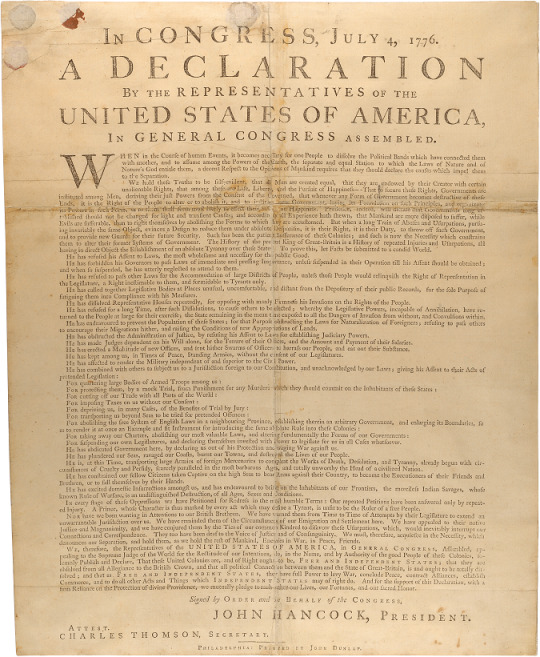
Happy Fourth of July!
This is the Dunlap Broadside, the first printed version of the Declaration of Independence.
File Unit: Rough Journals, 9/5/1774 - 3/2/1789
Series: Papers of the Continental Congress, 1774 - 1789
Record Group 360: Records of the Continental and Confederation Congresses and the Constitutional Convention, 1765 - 1821
Transcription:
IN CONGRESS, JULY 4, 1776.
A D E C L A R A T I O N
BY THE REPRESENTATIVES OF THE
UNITED STATES OF AMERICA
IN GENERAL CONGRESS ASSEMBLED.
WHEN in the Course of human Events, it becomes necessary for one People to dissolve the Political Bands which have connected them
with another, and to assume among the Powers of the Earth, the separate and equal Station to which the Laws of Nature and of
Nature's God entitle them, a decent Respect to the Opinions of Mankind requires that they should declare the causes which impel them
to the Separation.
We hold these Truths to be self-evident, that all Men are created equal, that they are endowed by their Creator with certain
unalienable Rights, that among these are Life, Liberty, and the Pursuit of Happiness -- That to secure these Rights, Governments are
instituted among Men, deriving their just Powers from the Consent of the Governed, that whenever any Form of Government becomes destructive of these Ends, it is the Right of the People to alter or to abolish it, and to institute new Government, laying its Foundation on such Principles, and organizing its Powers in such Form, as to them shall seem most likely to effect their Safety and Happiness. Prudence, indeed, will dictate that Governments long established should not be changed for light and transient Causes; and accordingly all Experience hath shewn, that Mankind are more disposed to suffer, while Evils are sufferable, than to right themselves by abolishing the Forms to which they are accustomed. But when a long Train of Abuses and Usurpations, pursuing invariably the fame Object, evinces a Design to reduce them under absolute Despotism, it is their Right, it is their Duty, to throw off such Government, and to provide new Guards for their future Security. Such has been the patient Sufferance of these Colonies; and such is now the Necessity which constrains them to alter their former Systems of Government. The History of the present King of Great-Britain is a History of repeated Injuries and Usurpations, all having in direct Object the Establishment of an absolute Tyranny over these States. To prove this, let Facts be submitted to a candid World.
HE has refused his Assent to Laws, the most wholesome and necessary for the public Good.
HE has forbidden his Governors to pass Laws of immediate and pressing Importance, unless suspended in their Operation till his Assent should be obtained; and when so suspended, he has utterly neglected to attend to them.
HE has refused to pass other Laws for the Accommodation of large Districts of People, unless those People would relinquish the Right of Representation in the Legislature, a Right inestimable to them, and formidable to Tyrants only.
HE has called together Legislative Bodies at Places unusual, uncomfortable, and distant from the Depository of their public Records, for the sole Purpose of fatiguing them into Compliance with his Measures.
HE has dissolved Representative Houses repeatedly, for opposing with manly Firmness his Invasions on the Rights of the People.
He has refused for a long TIME, after such Dissolutions, to cause others to be elected; whereby the Legislative Powers, incapable of Annihilation, have returned to the People at large for their exercise; the State remaining in the mean time exposed to all the Dangers of Invasion from without, and Convulsions within.
HE has endeavoured to prevent the Population of these States; for that Purpose obstructing the Laws for Naturalization of Foreigners; refusing to pass others to encourage their Migrations hither, and raising the Conditions of new Appropriations of Lands.
HE has obstructed the Administration of Justice, by refusing his Assent to Laws for establishing Judiciary Powers.
HE has made Judges dependent on his Will alone, for the Tenure of their Offices, and the Amount and Payment of their Salaries.
HE has erected a Multitude of new Offices, and sent hither Swarms of Officers to harrass our People, and eat out their Substance.
HE has kept among us, in Times of Peace, Standing Armies, without the consent of our Legislatures.
HE has affected to render the Military independent of and superior to the Civil Power.
HE has combined with others to subject us to a Jurisdiction foreign to our Constitution, and unacknowledged by our Laws; giving his Assent to their Acts of
pretended Legislation:
FOR quartering large Bodies of Armed Troops among us:
FOR protecting them, by a mock Trial, from Punishment for any Murders which they should commit on the Inhabitants of these States:
FOR cutting off our Trade with all Parts of the World:
FOR imposing Taxes on us without our Consent;
FOR depriving us, in may Cases, of the Benefits of Trial by Jury:
FOR transporting us beyond Seas to be tried for pretended Offences:
FOR abolishing the free System of English Laws in a neighbouring Province, establishing therein an arbitrary Government, and enlarging its Boundaries, fo
as to render it at once an Example and fit Instrument for introducing the fame absolute Rule into these Colonies:
FOR taking away our Charters, abolishing our most valuable Laws, and altering fundamentally the Forms of our Governments:
FOR suspending our own Legislatures, and declaring themselves invested with Power to legislate for us in all Cases whatsoever.
HE has abdicated Government here, by declaring us out of his Protection and waging War against us.
HE has plundered our Seas, ravaged our Coasts, burnt our Towns, and destroyed the Lives of our People
HE is, at this Time, transporting large Armies of foreign Mercenaries to compleat the Works of Death, Desolation, and Tyranny, already begun with cir-
cumstances of Cruelty and Perfidy, scarcely paralleled in the most barbarous Ages, and totally unworthy the Head of a civilized Nation.
HE has constrained our fellow Citizens taken Captive on the high Seas to bear Arms against their Country, to become the Executioners of their Friends and
Brethren, or to fall themselves by their Hands.
HE has excited domestic Insurrections amongst us, and has endeavoured to bring on the Inhabitants of our Frontiers, the merciless Indian Savages, whose
known Rule of Warfare, is an undistinguished Destruction, of all Ages, Sexes and Conditions.
IN every stage of these Oppressions we have Petitioned for Redress in the most humble Terms: Our repeated Petitions have been answered only by repeat-
ed Injury. A Prince, whose Character is thus marked by every act which may define a Tyrant, is unfit to be Ruler of a free People.
NOR have we been wanting in Attentions to our British Brethren. We have warned them from Time to Time of Attempts by their Legislature to extend an
unwarrantable Jurisdiction over us. We have reminded them of the Circumstances of our Emigration and Settlement here. We have appealed to their native
Justice and Magnanimity, and we have conjured them by the Ties of our common Kindred to disavow these Usurpations, which, would inevitable interrupt our
Connections and Correspondence. They too have been deaf to the Voice of Justice and Consanguinity. We must, therefore, acquiesce in the Necessity, which
denounces our Separation, and hold them, as we hold the rest of Mankind, Enemies in War, in Peace, Friends.
WE, therefore, the Representatives of the UNITED STATES OF AMERICA, in GENERAL CONGRESS, Assembled, ap-
pealing to the Supreme Judge of the World for the Rectitude of our Intentions, do, in the Name, and by Authority of the good People of these Colonies, so-
lemnly Publish and Declare, That these United Colonies are, and of Right ought to be, FREE AND INDEPENDENT STATES; that they are
absolved from all Allegiance to the British Crown, and that all political Connection between them and the State of Great-Britain, is and ought to be totally dis-
solved; and that as FREE AND INDEPENDENT STATES, they have full Power to levy War, conclude Peace, contract Alliances, establish
Commerce, and to do all other Acts and Things which INDEPENDENT STATES may of right do. And for the support of this Declaration, with a
firm Reliance on the Protection of divine Providence, we mutually pledge to each other our Lives, our Fortunes, and our sacred Honor.
Signed by ORDER and in BEHALF of the CONGRESS,
JOHN HANCOCK, PRESIDENT.
ATTEST.
CHARLES THOMSON, SECRETARY.
PHILADELPHIA: PRINTED BY JOHN DUNLAP.
#archivesgov#July 4#1776#1700s#Declaration of Independence#Continental Congress#Fourth of July#Independence Day#Dunlap Broadside
100 notes
·
View notes
Text
Ok so here’s the link to the Continental Congress Minutes written by Charles Thomson (or one of his assistants)
#of course I’ll be adding this to the pinned post#and it’s all transcripts so you don’t have to read cursive#amrev#charles thomson#continental congress
3 notes
·
View notes
Text

On This Day: the continental congress finalizes the articles of confederation, and everyone goes, "Whew, that was tough. Good thing we don't have to ever do that again!"
0 notes
Text


#amrev#amrev history#continental congress#declaration of independence#george washington#thomas jefferson
2 notes
·
View notes
Text
Continental Congress votes for independence from Britain
The Second Continental Congress, assembled in Philadelphia, formally adopts Richard Henry Lee’s resolution for independence from Great Britain. The vote is unanimous, with only New York abstaining.
The resolution had originally been presented to Congress on June 7, but it soon became clear that New York, New Jersey, Pennsylvania, Delaware, Maryland and South Carolina were as yet unwilling to declare independence, though they would likely be ready to vote in favor of a break with England in due course. Thus, Congress agreed to delay the vote on Lees Resolution until July 1. In the intervening period, Congress appointed a committee to draft a formal declaration of independence. Its members were John Adams of Massachusetts, Benjamin Franklin of Pennsylvania, Roger Sherman of Connecticut, Robert R. Livingston of New York and Thomas Jefferson of Virginia. Thomas Jefferson, well-known to be the best writer of the group, was selected to be the primary author of the document, which was presented to Congress for review on June 28, 1776.
On July 1, 1776, debate on the Lee Resolution resumed as planned, with a majority of the delegates favoring the resolution. Congress thought it of the utmost importance that independence be unanimously proclaimed. To ensure this, they delayed the final vote until July 2, when 12 colonial delegations voted in favor of it, with the New York delegates abstaining, unsure of how their constituents would wish them to vote. John Adams wrote that July 2 would be celebrated as the most memorable epoch in the history of America. Instead, the day has been largely forgotten in favor of July 4, when Jeffersons edited Declaration of Independence was adopted.
1 note
·
View note